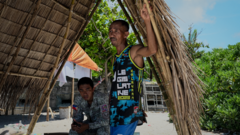On a remote patch of land known as Pagasa, which translates to "hope," the Philippines is showcasing resilience in the face of China's maritime dominance. This small island, measuring just 37 hectares and inhabited by about 300 residents, exists within contentious waters of the South China Sea, where multiple nations lay claim.
As fishermen cast their nets in turquoise waters, traditional wooden houses dot the landscape, while a looming presence of Chinese naval vessels patrols just offshore. For over a decade, China has expanded its influence, transforming submerged reefs into military bases. While only a handful of Southeast Asian nations are brave enough to challenge China's claims, the Philippines and Vietnam are among those daring to hold their ground.
Pagasa Island, which has a permanent civilian population, is pivotal for the Philippines’ territorial assertions. “It strengthens our legal claims,” says Jonathan Malaya, assistant director-general at the Philippines National Security Council. With a runway and community presence, Pagasa holds strategic importance.
Previously, getting to Pagasa required a long boat ride or a short flight, complicated by volatile weather. Recently, improvements like a larger runway have made supply deliveries, including food and goods, more reliable. Villagers now benefit from a functioning school and electricity, yet Chinese threats loom, forcing locals to adapt.
Fisherman Larry Hugo, who has faced direct intimidation from Chinese ships, has had to curtail his fishing grounds, affecting food sources. Meanwhile, teacher Realyn Limbo cherishes island life but notes the precariousness in securing healthcare for residents.
Pagasa's serene charm contrasts starkly with the geopolitical tensions clashing just offshore. With the Philippines government consistently lodging protests against Chinese activities, Pagasa stands as a testament to the community's resilience—a small but hopeful bulwark against overwhelming pressures. The islanders, while living lives of simplicity and tranquility, continue to navigate the complex waters of diplomacy and sovereignty.

















